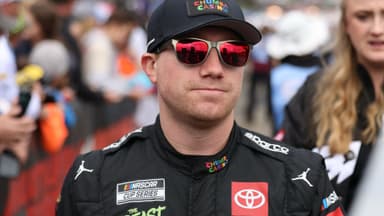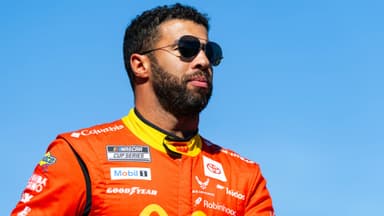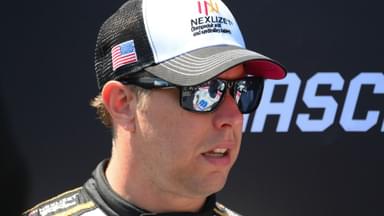Fans, insiders, and fellow competitors have all witnessed how Toyota drivers, particularly Denny Hamlin, approach racing with an all-or-nothing attitude. On the track, Hamlin may wear two hats as both driver and team owner, but once the green flag drops, he races anyone who stands in his way.
Advertisement
He expects non-playoff drivers to lend a helping hand to playoff contenders, and he would race hard against any playoff drivers, even if it is from the same manufacturer or his own team. However, that’s not a mindset shared across all manufacturers, as Chris Buescher recently pointed out.
In New Hampshire, for example, when Joe Gibbs Racing’s non-playoff driver Ty Gibbs refused to yield to Hamlin while fighting for 11th, the veteran made his frustration quite evident, crowding Gibbs into the wall and ending his teammate’s day. Hamlin simply stated that he wouldn’t pull any punches, even if his own non-playoff teammate tries to race him hard.
A similar story developed at Kansas, where Hamlin went door-to-door with his own 23XI Racing driver, Bubba Wallace, through the final turn. And although, in doing so, he left the bottom lane wide open for Chase Elliott to slip through and snatch the win, Hamlin proved that when he’s behind the wheel, there’s no room for sentiment; he’s a driver first, team owner second.
That mindset, however, doesn’t quite fit under the Ford banner. Team Penske’s drivers, including Ryan Blaney and Joey Logano, have long emphasized clean racing and teamwork.
Buescher echoed that sentiment ahead of the Talladega race, saying he knows exactly how he’s expected to race around Blaney or Logano. “You’re always aware of it. We’re aware of it throughout the playoffs,” he said.
“I think there’s been a pretty clear warning set for race manipulation right now, so I think that there’s certainly a finicky way to go about that and I don’t want to be caught up in that, and I don’t want anybody to ever accuse me of laying over for anybody, so ultimately we are still going to the racetrack to win a race. That’s not something that you would pull over or give anything away.”
Still, Buescher admitted there’s a balance to strike. If the situation gets dicey, say, a risky four-wide move, there’s a bit of extra calculation involved. But at the end of the day, every driver shows up to find a way to win.
When asked whether his loyalty lies with a Ford driver in the final moments, he said, “Yeah, and that’s always been the case. It doesn’t really matter if it’s the playoffs or not.”
The RFK Racing driver explained that manufacturer alliances play a big role at superspeedways. Drivers band together, syncing pit cycles and race strategies, often working to save fuel as a collective unit. “That’s always the case,” he said. “It doesn’t change just because we’re coming down to the end here.”







